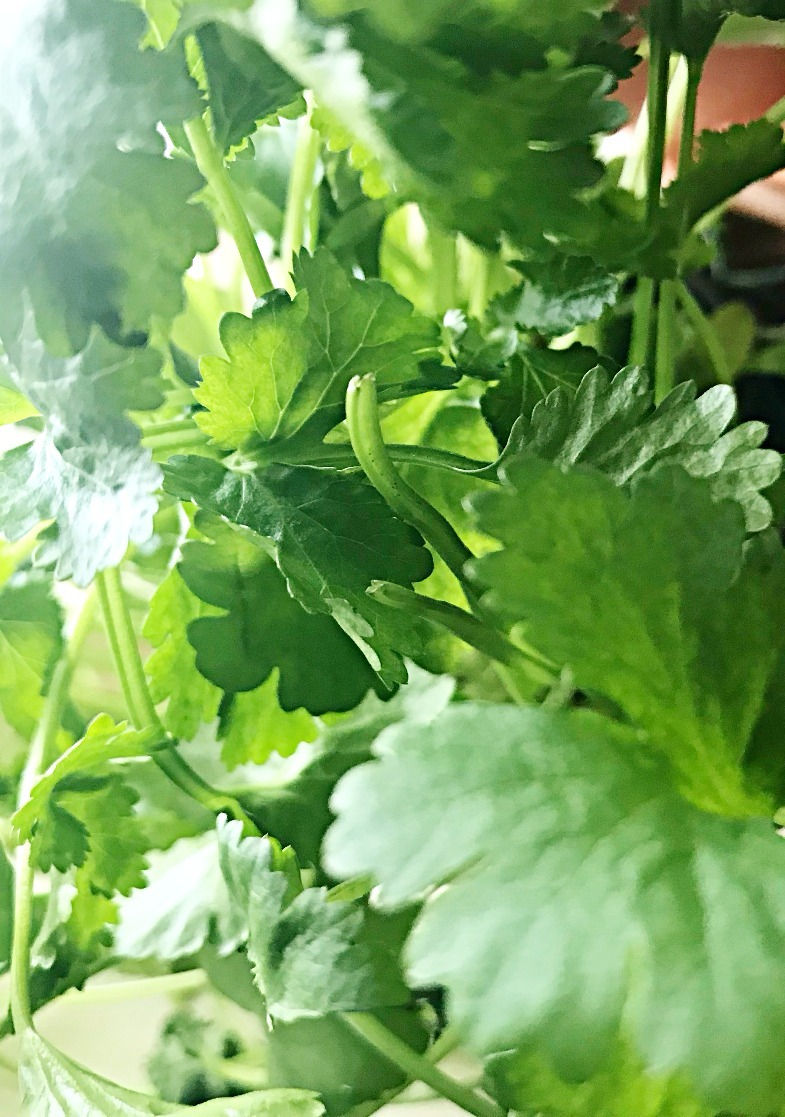Herbs and their fabulous health benefits
- Lorna Cameron

- Mar 10, 2018
- 6 min read

Here are the lovely herbs I buy each week. I have the beach on my doorstep at this time of my life instead of my lovely garden and greenhouse, which I'm sure I'll have again one day. Anyways for now I need to buy the fresh herbs I use daily rather than growing them. My favourites are basil, greek basil, coriander, parsley, thyme, rosemary, sage, oregano, mint and chives. There isn't a meal I cook that doesn't contain at least one herb but usually three, as not only do they enhance the flavour of dishes and give them that extra pizazz they are also packed full of antioxidants and phytonutrients with their potent health enhancing vitamins and minerals content. I pretty much go through all of these pots even when I'm on my own every week or so. Most herbs are really delicate and unless you are adding them to your stock should pretty much always be added in the last few minutes of cooking, exceptions here are thyme, sage and rosemary.

Thyme (Thymus vulgaris) is a fabulously fragrant and powerful herb that belongs to the mint family (Lamiaceae) and is a relative of the oregano genus (Origanum). It is beautiful in chicken dishes, added to stock, red meat, pork, wonderful in stews and creamy dishes and is particularly gorgeous with roasted vegetables and mushrooms.
It is said to boost your mood according to a research study published in 2013 as when the carvacrol found in this medicinal herb was administered to animals for seven consecutive days, it was able to increase dopamine and seratonin levels in the prefrontal cortex of the hippocampus, which are the two key neurotransmitters when it comes to your mood, it helps to lower blood pressure & cholesterol levels, helps with preventing food poisoning by decontaminating foods. The carvacrol has anti-tumour properties that help to fight cancerous cells. It has been used for centuries to treat coughs and bronchitis. Thyme has been known to be useful for stomach pains, parasitic infections, flatulence, whooping cough, sore throats, and skin disorders. It is a wonderful preventative addition to foods as it has anti-fungal and antiseptic properties and the bacterial fighting carvacrol and flavonoids, including, apigenin, naringenin, luteolin and thymonin which increase that superb antioxidant capacity.

Basil (Ocimum basilicum) is beautiful in tomato dishes, mediterranean roasted veg, fantastic with chicken, soups, eggs, fish, pesto, meatballs and salads. You only have to smell basil briefly and you can feel your mood uplift, it combats stress by acting as an adaptogen, so has been known to help with depression. It again contains disease fighting and protecting powerful antioxidants that protect the cells, including the blood vessels from free radical damage. It has the benefit of antibacterial and antimicrobial properties that combat viruses and infections. It promotes cardiovascular health by helping the cholesterol in the blood from oxidising. It has high levels of vitamin K essential for blood clotting and contains manganese, copper, vitamin A, vitamin C, calcium, folate, iron, omega 3 and magnesium.
The two water soluble flavonoids Orientin and vicenin which are of particular interest in basil, have been shown in some studies on human white blood cells, to protect cell structure as well as chromosomes from radiation and oxygen based damage. Also highlighting the potential health benefits of basil was the research conducted at the Swiss federation of technology which said that because basil contains (E)-beta-caryophyllene (BCP) it may well be useful in treating the inflammation in conditions such as arthritis and inflammatory bowel disease.

Parsley (Petroselinum crispum) is considered a superfood because of the high levels of antioxidants with its potent vitamins and minerals.
Parsley is lovely in salads, soups, served with new potatoes, butter and spring onions. Really lovely with fish and egg dishes in fact there aren't many dishes parsley doesn't marry well with as a garnish.
It has been used for many centuries in folk medicine, as a natural detox remedy, it is a diuretic, anti-inflammatory, antiseptic, anti-fungal and a free radical scavenger, heart protector, brain protector, and helps to regulate bowel movements, decrease bloating and soothe the digestive tract.
Parsley contains high levels of vitamin K, vitamin C and vitamin A, it also has vitamin E, vitamin B6 folate, iron, calcium, magnesium, copper, zinc, potassium, phosphorous, pantothenic acid, and potassium, sodium, thiamin, niacin, and riboflavin. It is considered a 'chemoprotective' as it helps protect DNA from damage. The limonene, eugenol and alphathujene are powerful oil components that benefits the immune system and helps with neutralising oxidative stress, which keeps carcinogens at bay. It is also well known as a breath freshener, especially after eating garlic! Parsley helps to remove heavy metals from the body also.

Mint (Mentha) is great with new potatoes, salads, in a yogurt and mint dip, used to make a nice refreshing summer drink with lemon. Especially good with lamb as it can sometimes be difficult to digest.
Mint is well known for its help in alleviating the pain, indigestion, bloating, flatulence and spasms of IBS, because of the menthol it contains, as it relaxes the muscles of the digestive tract. The essential oil has had good effects with alleviating migraines in clients. It is good for nausea too,
In a randomised controlled study (Moss, et al. International journal of neuroscience 2008), where 144 volunteers participated. Peppermint was shown to have improved alertness, memory and cognitive function. It is a natural stimulant which helps relieve fatigue and depression. It improves oral health and helps with bad breath. It is also said to help with congestion of the nose, throat and lungs. It is a good source of dietary fibre, has vitamin A, C, folate, niacin, calcium, iron, magnesium, phosphorous, zinc, potassium and sodium.

Rosemary (Rosemary Officinalis). Beautiful with lamb, beef, chicken, potatoes, stock, soups, roasted parsnips and carrots.
The benefits of rosemary include improving mood, reducing stress and anxiety, helping with circulation, most commonly known for improving cognitive function, memory and relieving migraines. Helps to regulate bowel movements and gastrointestinal problems. It is anti-inflammatory, antibacterial, anti-fungal. The active components including the ones that are anti-carcinogenic in nature help to attack pathogens that could threaten the immune system. It has been linked to being particulary powerful against bacterial infections such as H. Pylori which is a dangerous pathogen that can cause stomach ulcers and also Staph infections. As it has analgesic properties it is good for relieving pain in muscles. The anti-inflammatory and antioxidants compounds carnosol and carnosic acid have been linked to reducing inflammation of the muscles, blood vessels and joints. All things considered it can be beneficial with heart health, arthritis, M.E, CFS, M.S, fibromyalgia gout, blood pressure. Further more it is slightly diuretic which means it can help to flush out toxins.

Coriander (coriandrum sativum). Is fabulous in Indian curries, Thai curries, chicken dishes, creamy dishes and with roasted veg. It is also lovely in salads, soups, guacamole, salsa and humous.
It is well known for it's ability to remove heavy metals from the body. The acids present such as linoleic acid, oleic acid, palmitic acid, stearic acid and ascorbic acid are known to be very effective in reducing cholesterol levels in the blood, by reducing the bad LDL cholesterol deposits along the inner walls of the arteries and veins, which can lead to serious cardiovascular issues such as atherosclerosis, heart attacks and strokes. The compounds of essential oils found in coriander aid in digestion, proper functioning of the liver and bonding of bowels. It has been useful in helping when diarrhea is present. It had antiseptic and antimicrobial compounds which can help wounds and ulcers in the mouth from worsening. It is high in iron which is good for people who suffer from anemia which can cause shortness of breath, extreme fatigue and a decrease in cognitive function.
Multiple studies have shown coriander to have strong anti-histamine properties that can reduce the effects of hay fever. Coriander has high levels of dodecenal a natural compound that is actually twice as powerful as an antibiotic which is often the treatment for a salmonella based illness. It is a rich source of calcium which protects bone health.

Chives (Allium Schoenoprasum) are lovely in salads, egg dishes, cheese dishes, chicken dishes, added to new potatoes. If you grow then yourself the beautiful lilac flowers are delicious in a salad.
They are part of the allium family and are closely related to garlic, leeks and shallots (great prebiotics which feed the good bacterial probiotics). Cultivated for centuries for their pungent flavours and medicinal properties. Again they are nutrient dense with beneficial antioxidants, vitamins and minerals.
In a study published by the journal of the national cancer institute, researchers found that men with the highest intake of allium vegetables had the lowest risk for prostate cancer, especially when the cancer was localised. It also appears frequent intake of alliums such as chives lower the risk of esophageal and stomach cancers. It contains choline which is an important nutrient that helps with sleep, mood, muscles movement, learning and memory.
I will probably add more herbs to this post through time, but this just gives you a 'flavour' of the many reasons why introducing herbs into your daily diet whether it may be throughout your cooked food or adding them to your green juices or both as I do, can be so beneficial in a myriad of ways not only to improve your health but to fight off disease and maintain your wellbeing.
What’s your favourite herb and why?
Resources:



More resources:

Comments